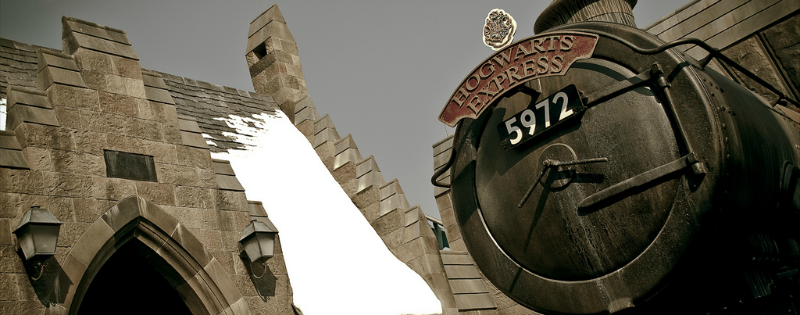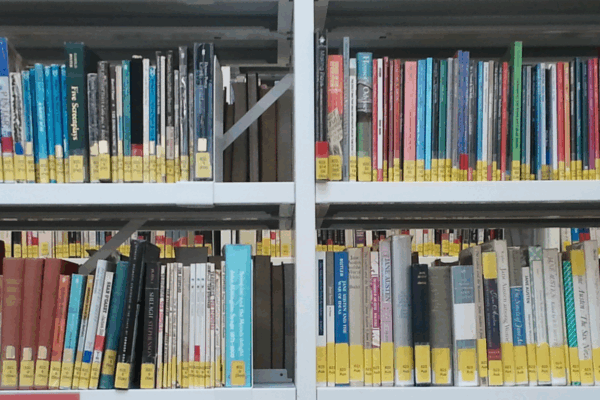To celebrate Banned Books Week, this year I sat down with three librarians to peek behind the curtain and examine the ways by which library books are chosen and challenged; I also wanted to get the inside scoop on what the future of the library looks like. This first installment of the two-part series features two local school librarians in Houston. Much like the superheroes they are, the two preferred to keep their true identities concealed, so I will be referring to them as “Barbara Gordon” and “Judy Dark," which happen to be the librarian alter-egos of the superheroes "Oracle" and "Luna Moth" (our apologies to D.C. Comics and Michael Chabon). Our next installment will feature my conversation with Peter Coyl, District Manager of the Dallas Public Library.

Librarians save lives: by handing the right book, at the right time, to a kid in need.
—Judy Blume
I’ve never known a bad librarian. I’ve certainly known a stern librarian or two, but never one who was incompetent or indifferent, never one who failed to appreciate the seriousness of their responsibilities or embrace the joys of learning and sharing knowledge.
However, until I sat down with Judy Dark and Barbara Gordon, two school librarians from Houston, Texas, I’d never met librarians so positively gleeful about their roles and responsibilities. Throughout the course of our conversation, it became clear that, perhaps unlike any other profession, the choice to become a librarian was more a calling than a job, and that perhaps the only thing librarians love as much as doing their jobs is talking about them.
Libraries are finite in size, and one of the librarian’s most daunting tasks is to decide which of the tens of millions of potential books to put on their limited amount of shelf space. Dark and Gordon explain that books are generally selected according to three criteria: 1) If the book is age-appropriate; 2) If the book has been well reviewed; and 3) if the book will inspire children to read.
Of course, “age appropriateness” means different things to different people, and while Dark and Gordon take into account the maturity of the themes and the complexity of the language, they tend to give their kids the benefit of the doubt when it comes to what they can handle. Librarians are also thorough in their consideration of evaluations for each book; it’s a much less grievous sin to stock a controversial book than it is a bad one.

However, a book’s ability to inspire is perhaps its most precious—as well as its most contentious—characteristic. At its core, the role of a school librarian is to inculcate a love of learning, and they are willing to fulfill that role by (nearly) any means necessary. To give an example, parents might not think too highly, say, of Captain Underpants and the Perilous Plot of Professor Poopypants, but according to Gordon, “the kids go absolutely crazy over it.” And when there’s a little distance between what inspires children and what their parents might not approve of, librarians like Dark and Gordon have to be prepared to defend the books they’ve selected.
The banning of books is both a morally and politically charged business, and there’s little librarians take more seriously. The process for a school book challenge is thorough, meticulous, diligent, and demanding. If a parent chooses to challenge a book, they must first fill out a challenge form and submit it to a committee consisting of librarians and other school staff. Each committee member reads the book, reviews of the book, insider publications, and other research, after which the committee reconvenes for an interview with the parent, where objections are raised and addressed. Should the parent wish to continue with their challenge, the final determination is made by either a district librarian, a principal, or a superintendent, depending on the school or school district.
For the most part, parents who request challenge forms rarely submit them. For those who do, most are either swayed by the committee or request that their own child—and not other people’s children—be restricted from checking out the book. Some parents refuse to read the book they’ve challenged, and as a result their objections are naturally ill-informed, poorly researched, and unlikely to sway any of the decision-makers in the challenge process.
Dark beams with pride when she says, “Nope, I’ve never lost a challenge.”
Gordon was quick to point out that book bans usually backfire. “The book you remove from the library,” says Gordon, “is the one all the kids want to read.” And it’s true; even in the grown-up world, book bans can do wonders for sales and circulation.

As a matter of fact, the proliferation of new technologies has rendered book challenges rarer than ever. Today kids are downloading reading material directly to their tablets, and the original objective of book bans—to keep the public from having access to a book—is a practical impossibility in the 21st century.
The librarian’s traditional responsibility as a guardian of learning is thus in constant flux. I asked Dark and Gordon if they were concerned about the future of their profession and the institution where they practice it. Both replied, emphatically, “No.” Libraries are stimulating spaces where kids can brainstorm, collaborate, and create. Dark and Gordon are no longer curators of knowledge, they said, but rather guides. They teach children how to sift through and make sense of the almost infinite knowledge available to them, how to seek out and verify sources. As the author Neil Gaiman once noted, “Google can give you 100,000 answers, but a librarian can give you the right one.”

